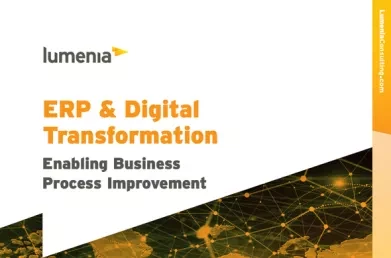Proving Value: Six Tips for Crafting a Compelling Digital Transformation Business Case
In my last blog article, I discussed the importance of developing a clear digital transformation strategy as a first step on any digital transformation journey. While your digital strategy serves to map out a path for IT investment a digital transformation business case is about justifying investment and securing budget for specific projects on that roadmap.
A strong project business case is all about persuasive storytelling. It should guide your decision-makers on the what, why and how of your digital initiative. In this article, we highlight six tips for creating compelling business cases so that buy-in, funding and resource commitment for your digital transformation projects become a no-brainer.

1. Alignment with Business Strategy
Before diving into the detail, remember this golden rule - strategic IT investment must support your leadership team's long-term business vision, be that business growth, diversification or consolidation. Your business case needs to demonstrate the project's relevance to that business direction, as an enabler for strategy realisation. If you can't make this link, the business case is unlikely to stack up. For more about business and IT strategy alignment, and setting out your digital transformation direction, check out our Digital Transformation Strategy service and our Demystifying Digital Transformation whitepaper.
2. Perform a Cost-Benefit Analysis
Numbers often speak louder than words. A well-executed cost-benefit analysis and return-on-investment projection are powerful tools for convincing decision-makers of your project's potential. You may need to survey the market to obtain realistic cost estimates for new digital solutions and you will need to meet with business owners to identify, quantify and agree benefits. Your analysis and projections for each solution option must be robust for a credible business case.
Revenue growth and cost savings are obvious wins, but not all benefits are financially quantifiable. Strategic and other non-tangible benefits can be just as important - think efficiency gains, improved product and service quality, increased customer satisfaction, better reporting and reduced risk.
3. Call out the Digital Transformation Project Risks
Speaking of risks, acknowledge project risks as part of your business case, and set out realistic mitigation strategies. This demonstrates your forward-thinking approach and builds stakeholder confidence in your readiness and ability to deliver a successful project outcome.
4. Pre-empt Stakeholder Concerns
Collaborate with stakeholders early and address their questions and concerns in your business case. This kind of early engagement is part of effective change management and is crucial where the introduction of digital technologies will change how people do their jobs. By listening to your stakeholders and responding constructively, you will build buy-in and avoid later challenges. Further to this, make sure to include provisions in your project budget for change management activities such as communications and end-user training.
5. Provide a Framework for Measuring Digital Transformation Success
Identify Key Performance Indicators (KPIs) that will be used to measure project success, tied to the expected benefits. Your business case should set out these KPIs and the processes and owners for monitoring and reporting on them. Following through on this approach will pay dividends for your wider digital transformation programme – if you plan and prove benefits realisation well on one project, your stakeholders will become more confident in the legitimacy of your business cases for subsequent projects on the digital roadmap.
6. Resource Allocation & Budgeting
Be realistic about establishing a team of internal resources to deliver your project, and tackle this head-on. Your digital transformation business case should spell out the required resource commitment, and you should include corresponding costs in your cost-benefit model. This might include backfilling of business-as-usual resources, for example, and contracting of outside specialists to fulfil key project roles. Internal resource costs can be substantial, and your business case will be inaccurate without factoring them in.
Producing a compelling business case for your digital transformation project requires a combination of strategic thinking, robust data analysis and effective communication. It can be challenging to pull this together but the effort is worthwhile. Ultimately, a sound business case provides a basis for project approval and for turning your digital transformation strategy into reality.
Find Out More
This blog was written by Principal Consultant Edward Abrahamson. Check out our service on Digital Transformation Business Case Development for information on how we can help with business case development, or reach out to Edward directly.


